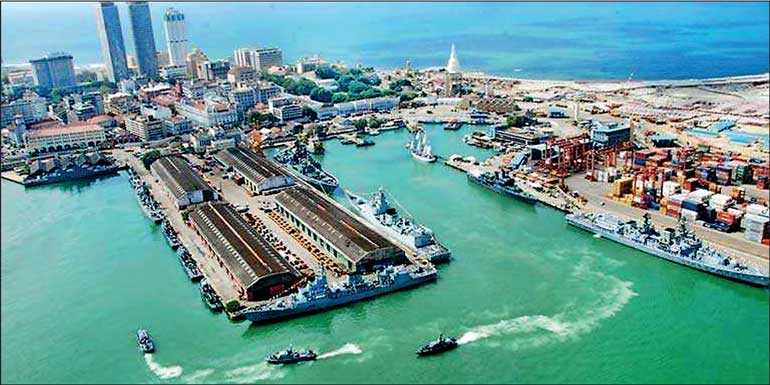Monday Feb 16, 2026
Monday Feb 16, 2026
Friday, 12 February 2021 00:00 - - {{hitsCtrl.values.hits}}

Having made opposition to the ECT project a central feature of their campaign at last year’s election, the Government’s decision appears to be no more than a politically motivated stunt
“The world must learn to work together, or finally it will not work at all” – Dwight Eisenhower, 34th US President
 Sri Lanka’s foreign policy is in the midst of a storm on the international stage. On Monday the Core Group responsible for the country at the United Nations Human Rights Council (UNHRC) announced that they would be presenting a fresh resolution against Sri Lanka. Coupled with the growing tensions between the Sri Lankan and Indian Governments, the foreign office certainly has its work cut out for it in the coming weeks and months.
Sri Lanka’s foreign policy is in the midst of a storm on the international stage. On Monday the Core Group responsible for the country at the United Nations Human Rights Council (UNHRC) announced that they would be presenting a fresh resolution against Sri Lanka. Coupled with the growing tensions between the Sri Lankan and Indian Governments, the foreign office certainly has its work cut out for it in the coming weeks and months.
Local news cycles have been dominated this year by stories regarding the East Container Terminal (ECT) at the Colombo Port and the tripartite agreement signed between Sri Lanka, India and Japan to jointly develop and operate the terminal.
Following weeks of demonstrations by unions and members of the ruling coalition, the Government made the surprise announcement that they would not be proceeding with the agreement. This decision followed a late evening Cabinet meeting, and left both India and Japan scratching their heads.
The news that this agreement was to be cancelled was all the more surprising considering India’s External Affairs Minister, Dr. S. Jaishankar, had paid a visit to the country a month ago. The ECT featured prominently in the discussions between the Indian Foreign Minister and Sri Lanka’s President and Prime Minister. The confidence in which New Delhi spoke of the continued cooperation between the two countries suggests that at no point was the possibility of the project being scrapped raised.
In the days and weeks leading up to the cancellation, prominent Cabinet Ministers and unions loyal to the Government had undertaken a campaign to oppose the project. The cancellation of the ECT project appears nothing more than a desperate attempt by the Government to quell the growing opposition from within their support base due to a rising host of issues on the ground.
Having made opposition to the ECT project a central feature of their campaign at last year’s election, the Government’s decision appears to be no more than a politically motivated stunt. In fact, shortly after the announcement that the agreement would be cancelled, the Cabinet of Ministers attempted to pacify India by offering them a higher stake in the still to be built West Terminal at the Colombo Port.
To date there has been no indication from India as regards this fresh offer. However, our Northern neighbours have been swift in expressing their displeasure at the unilateral decision. Media quoted an Indian High Commission spokesman who called on the Government of Sri Lanka to ensure the “expeditious implementation of the trilateral Memorandum of Cooperation (MoC) signed in May 2019 among the Governments of India, Japan and Sri Lanka for the development of ECT with participation from these three countries”.
Anger in India toward this apparent public repudiation has grown in the past few days with Indian media reporting that New Delhi is continuing to pressure Colombo to reverse their decision.
Reports have also emerged in India suggesting that China had a role in blocking their involvement in this strategic investment. China has their own presence in the Colombo Port at the Colombo International Container Terminals Ltd., which they hold an 85% stake, and it is believable that they would wish to protect their sole presence. With tension rising in the Indian Ocean between Sri Lanka and India, and India and China caught in their own diplomatic row, the pressure was on Sri Lanka’s foreign policy experts to step in and ensure that the situation was resolved.
However, over the weekend news emerged that the Sri Lankan Cabinet had previously agreed to award a project to a Chinese firm to setup hybrid wind and solar energy projects in three islands in the Northern Province.
Sri Lankan Governments have historically balanced relations between India and China by ensuring that India maintained its interests in the North and Central Provinces of the country, while China was allowed to mark their presence in the South. The surprise decision by the Cabinet to award this project to a Chinese firm has reportedly not gone down well with the Indian Government, who have allegedly lodged “a strong protest” with the Sri Lankan Government.
Having approved this project two weeks prior to cancelling the ECT tripartite agreement, the Cabinet has shown itself as either being incapable or unwilling to balance relations with India and China.
With the Government placing the country firmly in China’s corner, the ramifications are beginning to be seen. Last week the Central Bank of Sri Lanka concluded a $ 400 million currency swap they had initiated with India back in July last year.
Denying reports that India had called for the early cancellation, the Indian High Commission issued a communique clarifying the fact that the continuation of this swap was dependant on Sri Lanka having negotiated an agreement with the IMF. However, the communique concluded by reiterating “that India abides by all of its international and bilateral commitments in letter and spirit.” A clear message to Sri Lanka that while respecting their previous agreements with Colombo, New Delhi would certainly be thinking twice when accommodating future requests from Sri Lanka.
With Sri Lanka’s foreign reserves being reportedly lower than their foreign debt obligation for 2021, the withdrawal of $ 400 million from the Central Bank will certainly increase the pressure on the Government.
India’s apparent assertion that they will no longer be backing Sri Lanka wholeheartedly has certainly come at the worst possible time for the Rajapaksa administration. The next few months will see the foreign office face up to their steepest test with momentum building around the pending resolution at the UNHRC.
The UK has announced that they would be presenting a resolution promoting human rights and accountability in the country at the 46th session of the council in Geneva next month. This resolution is expected to follow up on the damaging report produced by the Office of the High Commissioner of Human Rights last month.
This is not the first time a Rajapaksa Government has been faced with a UNHRC resolution. Following the end of the war in 2009 Sri Lanka has seen itself the subject of several such resolutions. With the then Government opposing these resolutions, the council often found itself divided. In 2015, following the defeat of Mahinda Rajapaksa at the Presidential Election, the Yahapalana Government decided to co-sponsor a resolution (Resolution 30/1) in an attempt to rebuild the faltering international relations. The decision to work with the international community paid dividends as the pressure on the Government was eased and subsequent trade agreements such as the GSP+ with the EU was re-instated.
However, it would appear that cooperation on the international stage has once again been put on the backburner, with the Sri Lankan Government choosing instead to undertake a campaign of opposition towards the resolution. Suggestions are now emerging from the international community that targeted sanctions and travel bans maybe recommended at the UNHRC. As the country attempts to rebuild the collapsed economy, such moves would further weaken the Government. With India now unlikely to support Sri Lanka at the Council, the Government is forced to turn to China in the hope that they will be able to muster enough votes to defeat the proposed resolution.
One possible ally for Sri Lanka may be found in the form of Pakistan. At the end of February Pakistan’s Prime Minister, Imran Khan, is scheduled to visit the island. Pakistan has enjoyed a close relationship with China, and the foreign experts in the Sri Lankan Government are hopeful that through China’s urging Pakistan will lobby Sri Lanka’s cause amongst other Muslim nations. Of course, with the ongoing forced cremations in Sri Lanka drawing widespread criticism from Muslims around the world, the likelihood of the Muslim bloc coming out in support of Sri Lanka is certainly slim.
Sri Lanka’s apparent decision to reduce ties with India has certainly come at the worst possible time. Backed by nationalist policies and growing dissent from within their camp, the Government has found itself backed into a corner in regards foreign policy. Whether or not the decision to hedge their bets on China alone will pay dividends is still to be seen. But at a time when the world is closing ranks on China, the Sri Lankan Government would certainly be better off returning to a middle path on the international stage.